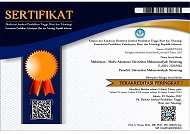The Influence of Environmental Performance Towards Creating Shared Value on Sri-Kehati Index
(1) Universitas Jakarta Internasional
(2) Universitas Jakarta Internasional
(*) Corresponding Author
Abstract
This research explores the influence of environmental performance on the concept of Creating Shared Value (CSV). CSV is a business approach that simultaneously promotes value creation for companies and society. About environmental performance, this study analyzes how environmentally friendly business practices can become a fundamental pillar of CSV strategy. We examine the relationship between corporate actions in reducing negative environmental impacts and increasing shared values through social welfare and business sustainability. By engaging case studies from various industries, we illustrate how proactive measures on environmental issues can generate long-term mutually beneficial benefits focused on creating shared value. UU No. 40 Tahun 2007 reads, "A company's social and environmental responsibility is its commitment to engage in sustainable economic development to enhance the environment and quality of life for the company, the local community, and society at large". Social and environmental responsibility is the company's commitment to sustainable economic development. This aims to enhance the standard of living and the environment to benefit the company, the local community, and society. The method used is multiple linear regression. Environmental performance indicators influence the company size, type of industry and capital intensity, significantly affecting CSV. The theoretical contribution of this research is to provide research results on the influence of environmental performance on CSV quantitatively and empirically in Indonesia because this topic is rarely discussed using a quantitative and empirical approach. The practical contribution expected from this research is that it can provide additional information to analyze company performance comprehensively by considering financial and environmental performance. Meanwhile, contributions from regulators related to the accounting sector, such as the Indonesian Accountants Association, could consider requiring sustainability reports for companies traded on the Indonesian Stock Exchange so that companies can be sustainable.
Keywords
Full Text:
PDFReferences
Aakhus, M., & Bzdak, M. (2012). Revisiting the Role of “Shared Value” in the Business-Society Relationship. Business & Professional Ethics Journal, 31(2), 231–246. https://doi.org/10.5840/bpej201231211
Acquier, A., Valiorgue, B., & Daudigeos, T. (2017). Sharing the Shared Value: A Transaction Cost Perspective on Strategic CSR Policies in Global Value Chains. Journal of Business Ethics, 144(1), 139–152. https://doi.org/10.1007/s10551-015-2820-0
Aggarwal, P. (2013). Impact of Corporate Governance on Corporate Financial Performance. IOSR Journal of Business and Management, 13(3), 01–05. https://doi.org/10.9790/487x-1330105
Alberti, F. G., & Belfanti, F. (2019). Creating Shared Value and Clusters: The Case of an Italian Cluster Initiative in Food Waste Prevention. Competitiveness Review, 29(1), 39–60. https://doi.org/10.1108/CR-01-2017-0008
Ardhani, K. D. W., & Yovani, N. (2022). Social Embeddedness on Fresh Milk Development Programs under Creating Shared Value Concept. 4th International Conference on Economics, Business, and Economic Education Science, ICE-BEES. https://doi.org/10.4108/eai.27-7-2021.2316886
Arena, M., Azzone, G., & Piantoni, G. (2020). Shared Value Creation during Site Decommissioning: A Case Study from the Energy Sector. Journal of Cleaner Production, 251. https://doi.org/10.1016/j.jclepro.2019.119587
Bergquist, A. K., & Eriksson, L. (2019). Sober Business: Shared Value Creation between the Insurance Industry and the Temperance Movement. Business History, 61(2), 322–342. https://doi.org/10.1080/00076791.2017.1380627
Bergquist, A. K., & Lindmark, M. (2016). Sustainability and Shared Value in the Interwar Swedish Copper Industry. Business History Review, 90(2), 197–225. https://doi.org/10.1017/S0007680516000374
Berry, M. A., & Randinelli, D. A. (1998). Proactive Corporate Environmental Management: New Industrial Revolution. Academy of Management Perspectives, 12(2). https://doi.org/https://doi.org/10.5465/ame.1998.650515
Beschorner, T. (2014). Business Ethics Creating Shared Value: The One-Trick Pony Approach. Business Ethics Journal Review, 1(17), 106–112. https://doi.org/http://doi.org/10.12747/bejr2013.01.17
Beschorner, T., & Hajduk, T. (2017). Creating Shared Value. A Fundamental Critique. Business Ethics Journal Review, 1(17), 27–37. https://doi.org/10.1007/978-3-319-48802-8_3
Brammer, S., & Millington, A. (2005). Corporate Reputation and Philanthropy: An Empirical Analysis. Journal of Business Ethics, 61(1), 29–44. https://doi.org/10.1007/S10551-005-7443-4
Campos-Climent, V., & Sanchis-Palacio, J. R. (2017). Article information : Journal of Knowledge Management, 1163–1182. https://doi.org/https://doi.org/10.1108/JKM-02-2017-0084
Carroll, A. B. (1991). The Pyramid of Corporate Social Responsibility: Toward The Moral Management of Organizational Stakeholders. Business Horizons, 34(4), 39–48. https://doi.org/10.1016/0007-6813(91)90005-G
Chen, Y. R. R., Hung-Baesecke, C. J. F., Bowen, S. A., Zerfass, A., Stacks, D. W., & Boyd, B. (2020). The Role of Leadership in Shared Value Creation from the Public’s Perspective: A Multi-Continental study. Public Relations Review, 46(1), 101749. https://doi.org/10.1016/j.pubrev.2018.12.006
Cho, C. H., & Patten, D. M. (2007). The Role of Environmental Disclosures as Tools of Legitimacy: A Research Note. Accounting, Organizations and Society, 32(7–8), 639–647. https://doi.org/10.1016/j.aos.2006.09.009
Corazza, L., Scagnelli, S. D., & Mio, C. (2017). Simulacra and Sustainability Disclosure: Analysis of the Interpretative Models of Creating Shared Value. Corporate Social Responsibility and Environmental Management, 24(5), 414–434. https://doi.org/10.1002/csr.1417
Corner, P. D., & Pavlovich, K. (2016). Shared Value Through Inner Knowledge Creation. Journal of Business Ethics, 135(3), 543–555. https://doi.org/10.1007/s10551-014-2488-x
Crane, A., Palazzo, G., Spence, L. J., & Matten, S. D. (2014). Contesting the Value of Creating Shared Value. California Management Review, 56(2), 130–153. http://www.jstor.org/stable/10.1525/cmr.2014.56.2.130.
Daudigeos, T., & Valiorgue, B. (2011). Conditions for Value Creation in the Marketplace CSR the Management of Issues: A Negative External Effects Framework. Business and Society, 50(1), 28–49. https://doi.org/10.1177/0007650310395544
de los Reyes, G., & Scholz, M. (2019). The Limits of the Business Case for Sustainability: Don’t count on ‘Creating Shared Value’ to Extinguish Corporate Destruction. Journal of Cleaner Production, 221, 785–794. https://doi.org/10.1016/j.jclepro.2019.02.187
de los Reyes, G., Scholz, M., & Smith, N. C. (2017). Beyond the “Win-Win”: Creating Shared Value Requires Ethical Frameworks. California Management Review, 59(2), 142–167. https://doi.org/10.1177/0008125617695286
de Zegher, J. F., Iancu, D. A., & Lee, H. L. (2019). Designing Contracts and Sourcing Channels to Create Shared Value. Manufacturing and Service Operations Management, 21(2), 271–289. https://doi.org/10.1287/msom.2017.0627
Dembek, K., Singh, P., & Bhakoo, V. (2016). Literature Review of Shared Value: A Theoretical Concept or a Management Buzzword? Journal of Business Ethics, 137(2), 231–267. https://doi.org/10.1007/s10551-015-2554-z
Elkington, J. (1994). Towards the Sustainable Corporation: Win-Win-Win Business Strategies for Sustainable Development. California Management Review, 36(2), 90–100. https://doi.org/10.2307/41165746
Felicia, & Limijaya, A. (2014). Triple Bottom Line dan Sustainability. Bina Ekonomi, Jurnal Ilmiah Fakultas Ekonomi Universitas Katolik Parahyangan, 18(1), 14–27. https://doi.org/https://doi.org/10.26593/be.v18i1.827.%25p
Fernández-Gámez, M. Á., Gutiérrez-Ruiz, A. M., Becerra-Vicario, R., & Ruiz-Palomo, D. (2020). The impact of Creating Shared Value on Hotels Online Reputation. Corporate Social Responsibility and Environmental Management, 27(5), 2201–2211. https://doi.org/10.1002/csr.1958
Freeman, R. E., Harrison, J. S., & Zyglidopoulos, S. (2018). Stakeholder Theory: Concepts and Strategies. Cambridge University Press. https://doi.org/https://doi.org/10.1017/9781108539500
Giuliani, E., Tuan, A., & Calvimontes Cano, J. (2021). Creating Shared Value Meets Human Rights: A Sense-Making Perspective in Small-Scale Firms. Journal of Business Ethics, 173(3), 489–505. https://doi.org/10.1007/s10551-020-04511-7
Gray, R., Kouhy, R., & Lavers, S. (1995). Corporate social and environmental reporting. Accounting, Auditing & Accountability Journal. https://doi.org/10.1108/09513579510146996
Ham, S., Lee, S., Yoon, H., & Kim, C. (2020). Linking Creating Shared Value to Customer Behaviors in the Food Service Context. Journal of Hospitality and Tourism Management, 43(December 2019), 199–208. https://doi.org/10.1016/j.jhtm.2020.04.002
Haninun, & Nurdiawansyah. (2014). Analysis of Effect Size Company, Profitability, and Leverage against Social Responsibility Disclosure of Listed Mining Industry in Indonesia Stock Exchange Period 2009-2012. Jurnal Akuntansi Dan Keuangan, 5(1), 1–18. https://doi.org/http://dx.doi.org/10.36448/jak.v5i1.444
Hartman, L. P. (2013). Business Ethics Proposition: Shared Value as an Incomplete Mental Model. Business Ethics Journal Review, 112(March), 471–476. https://doi.org/10.12747/bejr2013.01.06
Hasmi, N., & Rukmana, R. (2018). Pengaruh Corporate Social Responsibility Disclosure terhadap Kinerja Keuangan pada Perusahaan BUMN yang Terdaftar di BEI. Economix, Universitas Negeri Makassar, 6(2), 25–31. https://ojs.unm.ac.id/economix/article/view/10321
Hsiao, T. Y., & Chuang, C. M. (2016). Creating Shared Value Through Implementing Green Practices for Star Hotels. Asia Pacific Journal of Tourism Research, 21(6), 678–696. https://doi.org/10.1080/10941665.2015.1068194
Hules, M., & Xie, P. (2015). From Corporate Social Responsibility to Creating Shared Value: A Case study from Tetra Pak in Sweden. In Competing Responsibilities. Lund University.
Huselid, M. A., Jackson, S. E., & Schuler, R. S. (1997). Technical and Strategic Human Resource Management Effectiveness as Determinants of Firm Performance. Academy of Management Journal, 40(1), 171–188. https://doi.org/10.2307/257025
Ilmarinen, P., & Murat, A. (2018). Creating Shared Value in the Banking Industry: A Case Study from Finland. Finnish Business Review, May, 1–10. https://www.theseus.fi/handle/10024/152312%0Ahttps://search.ebscohost.com/login.aspx?direct=true&db=buh&AN=134225145〈=fr&site=ehost-live
Indrajaya, T., Wibowo, F. X. S., & Wiweka, K. (2022). Rising the Competitiveness of a Cultural Tourist Destination in Banten, Indonesia through Stakeholder Orientation, Strategic Capability, and Shared Value Creation. Budapest International Research and Critics Institute-Journal (BIRCI-Journal), 5(2), 13377–13389. https://doi.org/10.33258/birci.v5i2.5193
Jackson, I., & Limbrick, L. (2019). Creating Shared Value in an Industrial Conurbation: Evidence from the North Staffordshire Ceramics Cluster. Strategic Change, 28(2), 133–138. https://doi.org/10.1002/jsc.2254
Jones, S., & Wright, C. (2018). Fashion or Future: Does Creating Shared Value Pay? Accounting and Finance, 58(4), 1111–1139. https://doi.org/10.1111/acfi.12243
Jones, S., Wright, C., & Leth, M. (2018). Fashion or Future: Does Creating Shared Value Pay? Accounting and Finance, 58(4), 1111–1139. https://doi.org/10.1111/acfi.12243
Karwowska, E. (2021). Creating Shared Value by the University. Social Responsibility Journal, 17(1), 30–47. https://doi.org/10.1108/SRJ-05-2019-0172
Kaul, V. K. (2014). Creation of Shared Values by Indian Enterprises. SSRN Electronic Journal, 12. https://doi.org/https://dx.doi.org/10.2139/ssrn.2517881
Kim, R. C., Saito, A., & Avvari, V. M. (2020). Interpretation and Integration of “Creating Shared Value” in Asia: Implications for Strategy Research and Practice. Asian Business and Management, 19(4), 379–406. https://doi.org/10.1057/s41291-019-00064-4
Kullak, F. S., Baker, J. J., & Woratschek, H. (2021). Enhancing Value Creation in Social Purpose Organizations: Business Models that Leverage Networks. Journal of Business Research, 125(March 2019), 630–642. https://doi.org/10.1016/j.jbusres.2020.01.069
Lapina, I., Borkus, I., & Starineca, O. (2012). Corporate Social Responsibility and Creating Shared Value: Case of Latvia. International Journal of Social, Behavioral, Educational, Economic, Business and Industrial Engineering, 6(8), 2228–2234.
Lee, J. (2019). The Limits of Consequential Reasoning in Shared Value Creation. Competitiveness Review, 29(1), 26–38. https://doi.org/10.1108/CR-08-2016-0049
Martha, C., & Logahan, J. M. (2016). Human Rights Due Diligent (HRDD) and Human Rights Impact Assessment (HRIA) Best Practices to Corporate Shared Value (CSV): A Case of British Petroleum Tangguh Project in Papua. Binus Business Review, 7(November), 221–226. https://doi.org/10.21512/bbr.v7i3.1785
Matheis, M. (2016). Local Economic Impacts of Coal Mining in the United States 1870 to 1970. The Journal of Economic History, 76(4), 1152–1181. https://doi.org/10.1017/S002205071600098X
Mendy, J. (2019). Supporting the Creation of Shared Value. Strategic Change, 28(2), 157–161. https://doi.org/10.1002/jsc.2257
Menghwar, P. S., & Daood, A. (2021). Creating shared value: A systematic review, synthesis and integrative perspective. International Journal of Management Reviews, 23(4), 466–485. https://doi.org/10.1111/ijmr.12252
Meutia, I. (2023). Menata Pengungkapan CSR pada Bank Islam (Pendekatan Teori Kritis). Deepublish. https://repository.unsri.ac.id/94512/1/Menata_Pengungkapan_CSR_pada_Bank_Islam__%28Ithenticate%29.pdf
Michelini, L. (2012). Social Innovation and New Business Models; Creating Shared Value in Low-Income Markets. In International Journal of Public Sector Management Vol. 26 No. 1, 2013 pp. 74-85 q Emeral (Vol. 26, Issue 1). Springer. https://doi.org/10.1007/978-3-642-32150-4
Moon, H. C., Parc, J., Yim, S. H., & Park, N. (2011). An Extension of Porter and Kramer’s Creating Shared Value (CSV): Reorienting Strategies and Seeking International Cooperation. Journal of International and Area Studies, 18(2), 49–64. http://www.jstor.org/stable/43111578
Nakano, M., Kokubu, K., & Gemba, K. (2007). Corporate environmental and financial performances and the effects of information-based instruments of environmental policy in Japan Performances and the Effects of Informational 財団法人地球環境戦略研究機関. International Journal of Environment and Sustainable-Development, June 2016. https://doi.org/10.1504/IJESD.2007.012739
Octaceria, S., & Rahardja, L. (2020). Carbon Emission Reduction’s Impact on a Company’s Performance. Proceedings of the International Conference on Management, Accounting, and Economy (ICMAE 2020), 257–262. https://doi.org/10.2991/aebmr.k.200915.059
Orr, S., & Sarni, W. (2015). Does the Concept of “Creating Shared Value” Hold Water? Journal of Business Strategy, 36(3), 18–29. https://doi.org/10.1108/JBS-10-2013-0098
Park, K. O. (2020). How CSV and CSR Affect Organizational Performance: A Productive Behavior Perspective. International Journal of Environmental Research and Public Health, 17(7). https://doi.org/10.3390/ijerph17072556
Pavlovich, K., & Corner, P. D. (2014). Conscious Enterprise Emergence: Shared Value Creation Through Expanded Conscious Awareness. Journal of Business Ethics, 121(3), 341–351. https://doi.org/10.1007/s10551-013-1726-y
Poduska, R., Forbes, R., & Bober, M. (1992). The Challenge of Sustainable Development. Columbia Journal of World Business Review, 27, 286–291.
Porter, M., & Kramer, M. (2006). Strategy and Society: The Link Between Competitive Advantage and Corporate Social Responsibility. Harvard Business Review, 84(12), 78–93.
Porter, M., & Kramer, M. (2011). Creating Shared Value: How to Reinvent Capitalism- and Unleash a Wave of Innovation and Growth. Harvard Business Review, 49–58. https://doi.org/10.1108/09600039410055963
Prafitri, R. (2017). Creating Shared Value (CSV) in East Java, Indonesia: A Critical Analysis of CSV Impacts on Dairy Farming [Murdoch University]. https://www.semanticscholar.org/paper/Creating-Shared-Value-(CSV)in-East-Java%2C-Indonesia%3A-Prafitri/e5e7e2bfd89c55ee284ef25acc03d57780b50be1
Prinz, A. L. (2017). Corporate Social Responsibility (CSR). Cui bono? Ethical Economy, 52, 39–53. https://doi.org/10.1007/978-3-319-48802-8_4
Putri, A. P., & Triyono, A. (2020). Jogjakarta Communication Conference. Community, Dialog and Technology - Maximizing Creating Shared Value (CSV) Nestle Indonesia, 459(2nd), 35–40. https://doi.org/10.2991/assehr.k.200818.009
Rahardja, L. (2024). Corporate Sustainability towards Creating Shared Value: an Empirical Quantitative Evidence from Indonesia. Environment, Development and Sustainability, 0123456789. https://doi.org/10.1007/s10668-024-04559-9
Rahardja, L., Gunawan, I., Augustine, Y., & Wardhani, R. (2021). The Influence of Environmental Performance towards Creating Shared Value. Technium Social Sciences Journal, 18(1), 230–240. https://techniumscience.com/index.php/socialsciences/article/view/3033/1154
Rappaport, A. (1999). Creating Shareholder Value: A Guide for Managers and Investors. The Free Press. https://www.google.com/search?safe=strict&rlz=1C1GCEU_enID830ID830&sxsrf=ALeKk008tq3ReS 6TcvkmStt1W-2f_1UwNA:1583489910212&q=Kementerian+Lingkungan+Hidup+Republik+Indonesia.+Berikan+Kesempatan+Pada+Bumi+(Give+Earth+a+Chance).+Kementerian+Lingkungan+Hidup+R
Ratnatunga, J., & Jones, S. (2012). A Methodology to Rank the Quality and Comprehensiveness of Sustainability Information Provided in Publicly Listed Company Reports. In S. Jones & J. Ratnatunga (Eds.), Contemporary Issues in Sustainability Accounting, Assurance and Reporting (pp. 227–266). Emerald.
Rijkie, K. M., Sri, B., Alhumaira, F., Pratama, A. B., & Nur, S. (2022). Penerapan Konsep Creating Shared Value pada Pogram Corporate Social Responsibility PT Prertamina EP Donggi Matindok Field. Jurnal CSR, Pendidikan Dan Pemberdayaan Masyarakat, 3(1), 28–43. https://doi.org/https://doi.org/10.30872/ls.v3i1.1152
Ristanto, M., Rachman, A., Saptura, E., & Putra, V. P. (2023). Manifestation of PLN Nusantara Power UP Rembang in the Implementation of the Concept of Creating Shared Value in the Community Empowerment Program “DEWI SRI WARDANI.” Journal of Humanities and Social Sciences Studies, 5(10), 82–87. https://doi.org/10.32996/jhsss
Sari, Nuzula, S. R., & Firdausi, H. N. (2016). Pengaruh Pengungkapan Corporate Social Responsibility Terhadap Kinerja Keuangan Dan Nilai Perusahaan (Studi Komparatif pada Perusahaan Multinasional yang Terdaftar di Bursa Efek Indonesia dan Bursa Malaysia Tahun 2012-2015). Jurnal Administrasi Bisnis (JAB), 39(2), 74–83.
Shin, N. (2020). Creating Shared Value from Collaborative Logistics Systems: The Cases of ES3 and Flexe. Asia Pacific Journal of Information Systems, 30(1), 213–227. https://doi.org/10.14329/apjis.2020.30.1.213
Singkali, A. C. (2022). Jurnal Studi Sosial dan Politik Published by FISIP, Universitas Islam Negeri Raden Fatah Palembang. Jurnal Studi Sosial Dan Politik Published by FISIP, Universitas Islam Negeri Raden Fatah Palembang, 6(1), 126–133. https://doi.org/https://doi.org/10.19109/jssp.v6i1.11536
Spitzeck, H., & Chapman, S. (2012). Creating Shared Value as a Differentiation Strategy - the Example of BASF in Brazil. Corporate Governance (Bingley), 12(4), 499–513. https://doi.org/10.1108/14720701211267838
Sudarmanto, E., Revida, E., Zaman, N., Simarmata, M. M., Purba, S., Syafrizal;, Bachtiar, E., Faried, A. I., Nasrullah; Marzuki, I., Hastuti, P., Jamaludin; Kurniawan, I., Mastutie, F. ; Susilawaty, A. (2020). Konsep Dasar Pengabdian Kepada Masyarakat: Pembangunan dan Pemberdayaan (J. Karim, Abdul and Simarmata (ed.)). Yayasan Kita Menulis. https://repositori.uin-alauddin.ac.id/19805/1/2020_Book Chapter_Konsep Dasar Pengabdian Kepada Masyarakat.pdf
Ulya, M. A., & Prastiwi, A. (2014). Pengaruh Corporate Governance Terhadap Kinerja Ekonomi Perusahaan dengan Kinerja Lingkungan sebagai Variabel Intervening. Diponegoro Journal of Accounting, 3(3), 584–597. https://ejournal3.undip.ac.id/index.php/accounting/article/view/6202/0
Vishwanathan, P., Heugens, P. P. M. A. R., & Duran, P. (2019). Strategic CSR: A Concept Building Meta ‐ Analysis. Journal of Management Studies, 1(May), 1–37. https://doi.org/10.1111/joms.12514
Wang, H., Jiang, A., Ahmad, F., Abid, N., & Chandio, A. A. (2023). Attribute Imbalances and Innovation Implementation Based on Grounded Theory: A Case of Chinese Enterprises in Gansu Province. Business Strategy and the Environment. https://doi.org/https://doi.org/10.1002/bse.3497
Wang, S., Ahmad, F., Li, Y., Abid, N., Chandio, A. A., & Rehman, A. (2022). The Impact of Industrial Subsidies and Enterprise Innovation on Enterprise Performance: Evidence from Listed Chinese Manufacturing Companies. Sustainability (Switzerland), 14(8). https://doi.org/https://doi.org/10.3390/su14084520
Wójcik, P. (2016). How Creating Shared Value Differs from Corporate Social Responsibility. Journal of Management and Business Administration. Central Europe, 24(2), 32–55. https://doi.org/10.7206/jmba.ce.2450-7814.168
Wood, D. (1991). Corporate Social Performance Revisited. Academy of Management Review, 16(4), 691–718. https://doi.org/10.1515/crll.1969.239-240.333
Wu, J., Inoue, Y., Filo, K., & Sato, M. (2020). Creating Shared Value and Sport Employees’ Job Performance: the Mediating Effect of Work Engagement. European Sport Management Quarterly, 1–20. https://doi.org/10.1080/16184742.2020.1779327
Yang, T. K., & Yan, M. R. (2020). The Corporate Shared Value for Sustainable Development: An Ecosystem Perspective. Sustainability (Switzerland), 12(6), 1–16. https://doi.org/10.3390/su12062348
Yelpo, C. P., & Kubelka, L. (2019). Shared Value Clusters in Austria. Competitiveness Review: An International Business Journal, 29(1), 61–76. https://doi.org/10.1108/CR-08-2016-0050
Yoo, H., & Kim, J. W. (2019). Creating and Sharing a Bigger Value: A Dual Process Model of Inter-Firm CSV Relative to Firm Performance. Journal of Business Research, 99(October), 542–550. https://doi.org/10.1016/j.jbusres.2017.10.038
Article Metrics
Abstract view : 193 timesPDF - 3 times
DOI: https://doi.org/10.26714/mki.15.1.2025.1-19
Refbacks
- There are currently no refbacks.
-----------------------------------------------------------------------------------------------------------------------------------------------------------------------------------
 | MAKSIMUM: Media Akuntansi Universitas Muhammadiyah Semarang |
![]()
Maksimum: Media Akuntansi Universitas Muhammadiyah Semarang is licensed under a Creative Commons Attribution Attribution-NonCommercial-NoDerivatives 4.0 International License.

















